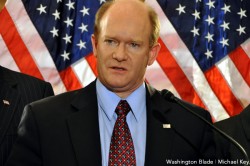National
Civil unions begin in Delaware, Hawaii
Sen. Coons attends New Year’s Day ceremonies for couples


Del. Sen. Chris Coons (D) attended civil union ceremonies for two couples in Wilmington on New Year’s Day.
U.S. Sen. Chris Coons (D-Del.) attended separate civil union ceremonies in Wilmington on New Year’s Day for a gay male and lesbian couple who became the first two same-sex couples to be joined under Delaware’s civil unions law.
“It was very nice to have a senator in attendance as well as lots of family and friends,” said Mac Gardner, who was joined in the ceremony with his partner of 15 years, Michael Clement.
Earlier in the day, Lisa Goodman, an attorney and president of Equality Delaware, and her partner, attorney Drew Fennell, became the first couple to be joined under the law, which the Delaware Legislature passed and Democratic Gov. Jack Markell signed in April.
The Hawaii civil unions law, which passed in the state legislature last February, also took effect on Jan. 1.
“This new law will provide a much needed legal framework to support and fortify the bonds between couples and families,” said Gigi Lee, co-chair of Equality Hawaii Foundation, a statewide LGBT group.
Although the Delaware civil unions law took effect Jan. 1, civil union ceremonies weren’t expected to begin until Jan. 3, when county offices that issue both marriage and civil union licenses were scheduled to reopen following the New Year’s holiday.
But Kenneth Boulden, Clerk of the Peace for New Castle County, which includes the City of Wilmington, took the unusual step of opening his office on New Year’s Day for couples that wished to obtain a civil union license and undergo a civil union ceremony on the day the law went into effect.

Mac Gardner and Michael Clement were joined in a Delaware civil union on Jan. 1. About 50 such licenses were expected to be issued statewide by Tuesday.
According to Gardner, Boulden also issued a one-time waiver of a required 24-hour hold on the issuance of a civil union license to enable same-sex couples to partake in civil unions on that day. The 24-hour hold also applies for marriage licenses.
“It was really nice of him to do that,” said Gardner. “He is a strong supporter of the civil unions.”
Boulden told the Blade that as of noon on Tuesday – the first day that the state’s three counties began to issue civil union licenses on a normal basis – 16 such licenses had been issued by New Castle County, four had been issued from Kent County, and 12 had been issued by Sussex County, which includes the popular gay resort town of Rehoboth Beach.
A total of about 50 civil union licenses were expected to be issued in all three counties by the end of the day on Tuesday, Boulden said.
“There were no glitches in the system,” he said. “Everything went smoothly.”
Steve Elkins, executive director of CAMP Rehoboth, an LGBT community center and service organization in Rehoboth, said the town’s first civil union was to take place at the center on Wednesday.
Unlike Boulden, the Clerk of the Peace in the conservative-oriented Sussex County, George Parish, spoke out against the civil unions law at the time it was pending before the legislature. Elkins said that after the legislature approved the measure, Parish promised to comply with its requirement that civil union licenses be issued to same-sex couples.
Parish couldn’t be immediately reached for comment.
“My hope is it will be handled just like any other marriage license,” Elkins said.
The Hawaii law took effect nearly 20 years after a battle over same-sex marriage in the state triggered a flurry of state constitutional amendments that ban same-sex marriage in more than 20 states, including Hawaii.
The state bans on same-sex marriage followed a 1993 decision by the Hawaii Supreme Court that declared Hawaii’s constitution prohibited the state from preventing same-sex couples from marrying. The state legislature responded by adopting a constitutional amendment, later ratified by voters, that defined marriage in the state as a union only between one man and one woman.
While calling the passage of a civil unions bill in Hawaii a “momentous and unprecedented step forward,” officials with Equality Hawaii said their ultimate goal is to bring about full marriage rights for same-sex couples.
“Marriage is still the ultimate expression of love and commitment in our society,” said Alan Spector, a member of the group’s advisory board. “To argue this isn’t the case for same-sex couples is to deny their very membership in society and their investment in its collective belief and aspirations.”
District of Columbia
Fire by arson forced temporary shutdown of Glorious Health Club
Spa and art gallery catering to gay
men expects to reopen in August

In a little noticed development, D.C.’s Glorious Health Club, which bills itself as a spa, art gallery, and community center catering to gay men, was forced to close on May 19 after one or more unidentified suspects ignited a fire inside the club that D.C. fire department officials have ruled an act of arson.
Robert Siegel, the club’s owner, told the Washington Blade that he and investigators with the D.C. Fire and Emergency Medical Services Department believe one or more yet unidentified suspects broke into the kitchen of the former warehouse building where the club is located at 2120 West Virginia Ave., N.E.
According to Siegel, investigators with the fire department’s arson squad believe a flammable liquid was used to start the fire in the kitchen and in two other locations within the building.
“Three separate fires were started,” Siegel said. “They started one on a staircase and one on the upstairs storage area,” he said in addition to the one in the kitchen. He said about 40 patrons were in the club at the time the fire started, and all were able to leave without injury.
Siegel said the fire caused $500,000 worth of damage to his building, with some of the damage caused — understandably he said — by fire fighters who had to rip open doors and break through the roof to gain access to the flames that engulfed parts of the interior of the building. He said he arranged for repair work to begin after the fire was extinguished.
“I expect we’ll be reopening in about a month from now,” he said. “And we’ll be a bigger and better place.”
Fortunately, Siegel said, most of the artwork and art exhibits located in the club were not damaged.
“It was basically the kitchen, patio, and the roof,” he said, adding that much of the solar panels he had on the roof were destroyed by the fire or by firefighters seeking to gain access to the building.
“And the fire was so hot it did structural damage to the roof,” he said. “It actually melted steel. We’re talking about 50-foot steel beams that have to be replaced,” he told the Blade. “That’s $100,000 right there.”
Vito Maggiolo, a spokesperson for the D.C. Fire and Emergency Medical Services Department, said the fire was “ruled incendiary/arson” and is “under active investigation.”
It could not immediately be determined if one or more people responsible for the fire targeted the Glorious Health Club because it’s a gay community establishment.
National
House Republicans propose steep cuts in federal AIDS budget
Advocacy groups say move would eliminate ‘Ending HIV Epidemic’ initiative

The Republican-controlled U.S. House Subcommittee on Labor, Health, and Human Services, Education, and Related Agencies approved a spending bill on June 26 that calls for cutting at least $419 million from federal AIDS programs that AIDS activists say would have a devastating impact on efforts to greatly reduce the number of new HIV infections by 2030.
The subcommittee’s proposed bill, which includes billions of dollars in cuts in a wide range of other federal health, education, and human services related programs, is scheduled to be considered by the full House Appropriations Committee on July 10. Officials with AIDS advocacy groups say they are hopeful that the full committee, like last year, will refuse to approve the proposed cuts in the AIDS budget.
The proposed GOP cuts would eliminate $214 million from the U.S. Centers for Disease Control and Prevention’s HIV prevention programs, $190 million from the Ryan White HIV/AIDS Program, and $15 million from the Department of Health and Human Services Secretary’s Minority HIV/AIDS Program.
Activists say the impact of those cuts would kill the federal government’s Ending the HIV Epidemic initiative, which among other things, calls for reducing the number of new HIV infections in the U.S. by 75 percent by 2025 and by 90 percent by 2030. The activists point out that ironically the Ending the HIV Epidemic initiative was launched during the administration of President Donald Trump.
“Instead of providing new investments in ending HIV by increasing funding for testing, prevention programs, such as PrEP, and life-saving care and treatment, House Republicans are again choosing to go through a worthless exercise of cutting programs that the American people depend on and will never pass,” said Carl Schmid, executive director of the HIV + Hepatitis Policy Institute.
“While we vigorously fight these cuts, we look forward to working with the entire Congress in a bipartisan fashion on spending bills that can actually become law,” Schmid said in a statement.
Schmid noted that the bill also includes provisions known as “policy riders” that would take away rights and protections from women, such as access to birth control and abortion, and for minorities, including LGBTQ people.
According to a statement released by the office of Rep. Rosa DeLauro (D-Conn.), who is the ranking minority member of the House Appropriations Committee, one of the policy riders would “block the Biden administration’s policies to ensure nondiscrimination on the basis of gender identity and sexual orientation.’ The statement says another policy rider would “prevent policies or programs intended to promote diversity, equality, or inclusion.”
Most political observers believe the Democratic-controlled U.S. Senate would also kill the GOP proposed policy riders and cuts in the AIDS budget if the full Republican-controlled House were to approve the budget bill passed by the appropriations subcommittee.
Rep, Tom Cole (R-Okla.), who serves as chair of the full House Appropriations Committee, released a statement on June 27 defending the subcommittee’s bill and its proposed spending cuts. “The bill provides appropriate and fiscally responsible funding to ensure these departments can continue to perform their core missions while also acknowledging the fiscal realities facing our nation,” he said.
“Importantly, the bill pushes back on the Biden administration’s out-of-touch progressive policy agenda, preventing this White House from finalizing or implementing controversial rules or executive orders,” Cole said in his statement. “It also preserves long standing bipartisan policy provisions protecting the right to life.”
U.S. Supreme Court
Concern over marriage equality in US grows two decades after first Mass. same-sex weddings
Gay and lesbian couples began to marry in Bay State in 2004

Two decades after Massachusetts became the first state to legalize same-sex marriage, a new study reveals both significant progress and ongoing challenges for married LGBTQ couples in the U.S., with a growing sense of insecurity about the future of their rights.
The Williams Institute at UCLA School of Law surveyed 484 married same-sex couples from all 50 states and D.C. The study, released Monday, marks the 20th anniversary of legal same-sex marriage in the U.S.
Researchers found that 93 percent of respondents cited love as a primary reason for marrying, with 75 percent also mentioning legal protections. Over 83 percent reported positive changes in their sense of security, and 74.6 percent noted improved life satisfaction since marrying.
However, the study also highlighted persistent discrimination and growing concerns about the future. About 11 percent of couples who had a wedding reported facing prejudice during the planning process.
Alarmingly, nearly 80 percent of respondents expressed concern about the potential overturning of the 2015 Obergefell v. Hodges decision, which legalized same-sex marriage nationwide. This anxiety has been exacerbated by initiatives like Project 2025, a conservative policy blueprint that some fear could roll back LGBTQ rights if implemented.
The possibility of a former President Donald Trump victory in the upcoming election has further intensified these concerns. Many respondents cited Trump’s previous U.S. Supreme Court appointments and his statements on LGBTQ issues as reasons for their apprehension. One participant stated, “The thought of another Trump presidency keeps me up at night. We’ve come so far, but it feels like our rights could be stripped away at any moment.”
The current political climate has 29 percent of respondents considering moving to another state, with 52.9 percent citing socio-political concerns as a primary reason. This reflects a growing sense of insecurity among LGBTQ couples about their rights and freedoms.
Brad Sears, founding executive director of the Williams Institute, noted, “The data clearly show that marriage equality has had a profound positive impact on same-sex couples and their families. However, it also reveals ongoing challenges and serious concerns about the future of these rights in light of current political trends and the upcoming election.”
Christy Mallory, legal director at the Williams Institute and lead author of the study, added, “This research provides crucial insights into the lived experiences of same-sex couples two decades after marriage equality began in the U.S. The high level of concern about potential loss of rights underscores the continued importance of legal protections and public support for LGBTQ+ equality.”
The study found that 30 percent of surveyed couples have children, with 58.1 percent of those parents reporting that marriage provided more stability for their families. However, many of these families now worry about the security of their legal status in the face of potential policy changes and shifting political landscapes.
As the nation reflects on two decades of marriage equality, the study underscores both the transformative power of legal recognition and the ongoing need for vigilance in protecting LGBTQ+ rights. The findings highlight the complex reality faced by same-sex couples in America today: Celebrating hard-won progress while grappling with uncertainty about the future, particularly in light of upcoming political events and potential shifts in leadership.
-

 Canada2 days ago
Canada2 days agoToronto Pride parade cancelled after pro-Palestinian protesters disrupt it
-

 Baltimore4 days ago
Baltimore4 days agoDespite record crowds, Baltimore Pride’s LGBTQ critics say organizers dropped the ball
-

 Sports4 days ago
Sports4 days agoHaters troll official Olympics Instagram for celebrating gay athlete and boyfriend
-

 Congress5 days ago
Congress5 days agoMembers of Congress introduce resolution to condemn Uganda’s Anti-Homosexuality Act









